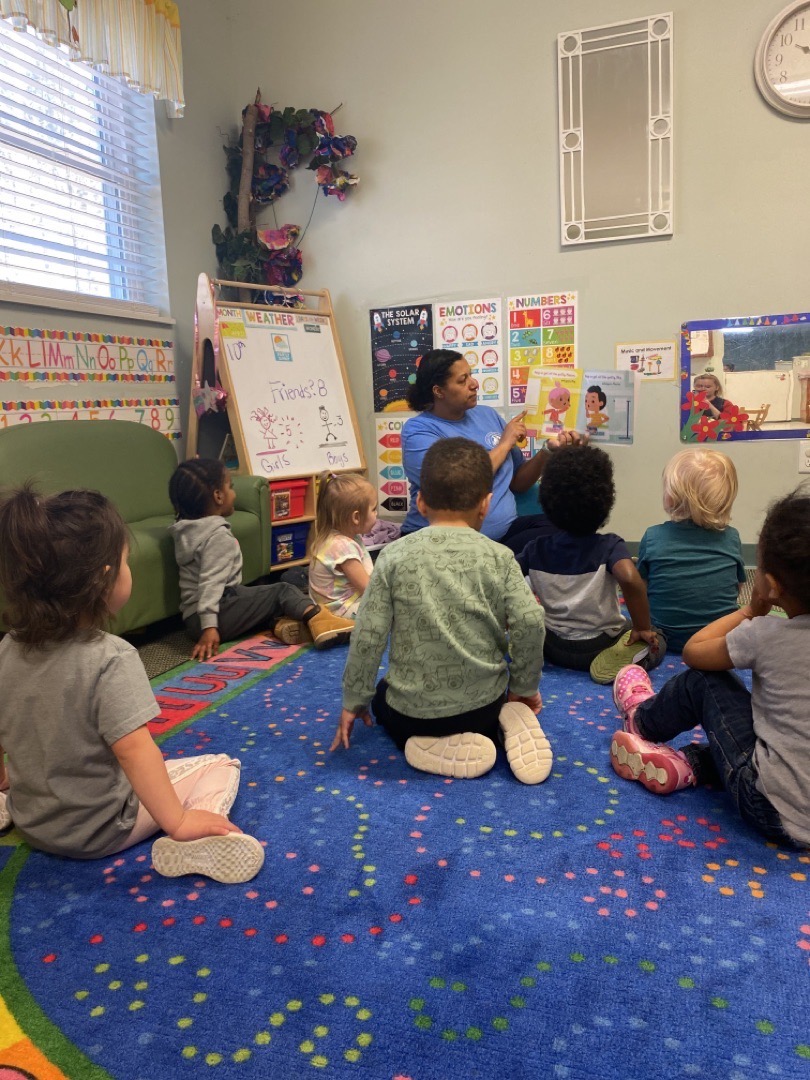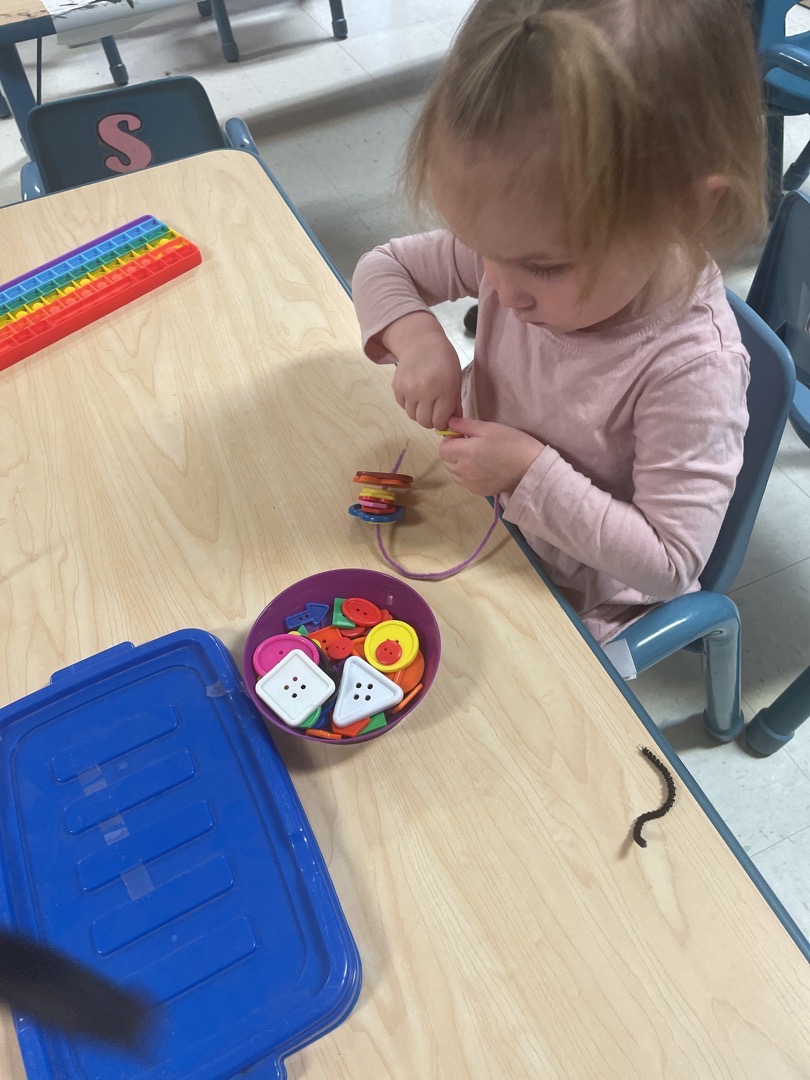Curriculum
Dorothy’s Discovery Daycare Center’s philosophy aligns closely with the HighScope Curriculum; We Engage, We Play, We Encourage. HighScope’s active learning has been carefully designed to promote independent, creative thinking; decision-making; and problem solving in children from birth through kindergarten. The HighScope Infant-Toddler and Preschool Curriculum focuses on providing engaging classrooms and routines that support children’s play with a variety of learning opportunities, as well as encouraging adult-child interactions.
What We Teach
Research based and child focused, the HighScope Curriculum uses a carefully designed process of learning through discovery, called active participatory learning. During active learning, caregivers encourage children to discover the world around them by exploring and playing. Learning and development are anchored by long-term, trusting relationships with caregivers, who are close at hand to support children as they play. In the HighScope Curriculum, learning is focused on the following nine content areas that correspond to state and national standards.
Approaches to learning
Social and Emotional Development
Physical Development and Health
Language, Literacy and Communication
Mathematics
Creative Arts
Science and Technology
Social Studies
English Language Learning (if applicable)
How We Teach
Your youngest learners need to feel safe and supported so they can learn with their whole body and all of their senses. In a HighScope programs, teachers focus on developing supportive, trusting relationships with the children in their care. We create rich environments that encourage very young children to explore and discover the world around them, helping them to engage in experiences designed to support their optimal development in all domains.
Principles of Active Learning
Adult-Child Interaction
Infant/Toddler- Nurturing, responsive teachers practice primary caregiving and continuity of care by scaffolding the individual needs and temperaments of infants and toddlers. Key strategies for adult-child interactions are touching, holding, playing alongside infants and toddlers at their level and pace, communicating in give-and-take exchanges verbally and nonverbally, respecting children’s choices and encouraging their efforts, acknowledging children’s strong emotions, and involving toddlers in resolving conflicts.
Preschool- Teachers act as partners, working alongside children and communicating with them both verbally and nonverbally to encourage learning. Key strategies for adult-child interactions are sharing control with children, communicating as a partner with children, scaffolding children’s play, using encouragement instead of praise, and taking a problem-solving approach to supporting children in resolving conflicts.
Learning Environment
Infant/Toddler- The physical space is safe, flexible, and child oriented to provide comfort and accommodate the changing developmental needs and interests of the earliest learners. The space is organized into play and care areas that serve the needs of infants and toddlers and stocked with a variety of sensory-motor materials that infants and toddlers can reach, explore, and play with in their own way at their own pace. With nurturing and responsive caregivers as a home base, infants and toddlers are free to move about, explore materials, exercise creativity, and solve problems.
Preschool- To create a predictable and active learning environment, teachers arrange and equip the classroom with diverse, open-ended materials that reflect children’s home, culture, and language. The room is organized and labeled to promote independence and encourage children to carry out their intentions.
Schedules and Routines
Infant/Toddler- A consistent yet flexible routine that accommodates individual children’s natural rhythms and temperaments gives infants and toddlers a sense of security and stability that creates trust between the child and teacher and builds independence as children engage with their environment and the people around them. Each routine is built around daily events and caregiving routines that value infants’ and toddlers’ active learning.
Preschool- A consistent framework for the day provides a balanced variety of experiences and learning opportunities. Children engage in both individual and social play, participate in small- and large-group activities, assist with cleanup, socialize during meals, develop self-care skills, and exercise their small and large muscles. The most important segment of the daily routine is the plan-do-review sequence, in which children make decisions about what they will do, carry out their ideas, and reflect upon their activities with adults and other children. These higher-level thinking skills are linked to the development of executive functions, which are needed to be successful in school and life.
Observation
Infant/Toddler- Ongoing child and program assessment is an underlying component of the HighScope Curriculum. Objective observations of children allow teachers to intentionally plan to build on individual and group interests and scaffold development by supporting what children know while gently extending their learning.
Preschool- Ongoing child assessment is also an underlying component of the HighScope Curriculum. Objective anecdotal observations of children collected throughout children’s natural play allow teachers to assess child progress and plan meaningful learning experiences.
Daily Schedules
In HighScope settings, caregivers maintain the overall routines as consistently as possible, while flexing it to accommodate individual children’s natural rhythms and temperaments.
Parts of the daily schedule
Arrivals and Departures
Morning Meeting
Message board is one of the first activities we do during the day. Children have the opportunity to read our messages as we draw our pictures and write common words. It is an activity that is helpful for starting the day, communicating new toys, events, or other important information.
Choice Time (Plan, Do, Review)
Work time is at least 60 minutes of child led free play. Children can play and be creative with the toys in their classroom. Teachers play along with the children, get down on their level, and follow the children’s lead. We are able to observe their behavior and focus on guiding each child as an individual. Children get to choose from House, Block, Toy, Book, Writing, Sand and Water, and Art.
Small Group
Our small groups activities are teacher planned to measure child’s development based on our nine content areas.
Large Group
Our Large group activities are teacher planned music and movement activities.
Outside Time
Outdoor play is very important part of the daily schedule; physical health, development, and wellbeing. Outdoor play is at least 60 minutes of child led free play. We have a climber, sandbox, swing, tables for activities, mud kitchen, and more.
How We Evaluate
Research tells us that the best programs consistently measure how well caregivers do their jobs and whether children are developing as they should be. They use the results to continue what is working and improve what is not.
Team Planning
Teachers observe and collect anecdotal notes for the COR to use with daily team planning. This happens every day in a HighScope program.
COR Advantage
COR Advantage is HighScope’s Birth through Kindergarten child assessment, which evaluates children’s learning in nine content areas. Each day, teachers and caregivers document brief written descriptions, or anecdotes, that objectively describes these very young children’s behaviors. They use these notes to evaluate children’s development and then plan activities to help.
Classroom Assessment Scoring System (CLASS ®)
CLASS®- IS a program observation tool used to support quality improvement with the specific goal of improving child outcomes. CLASS is a nationally recognized tool for measuring adult-child interactions. Children in classrooms with higher CLASS scores have been proven to have better social-emotional, cognitive, and academics outcomes.
Infant- Responsive Caregiving
Toddler- Emotional and Behavioral Support. Engaged Support for Learning.
Preschool- Emotional Support. Classroom Organization. Instructional Support.
DDDC uses the Ages and Stages (ASQ3) to assess child learning and growth. Each child is assessed two to three times a year depending on the child’s age. Once assessed parent/teacher conferences are set up to discuss each child’s individual progress. Conferences are also available anytime throughout the year. Contact your child’s teacher for more details.
For more information on Ages and Stages (ASQ3), please click here.
Early Childhood Standards of Quality is a publication which explains the purpose, history and application of the Standards the Michigan Department of Education has developed to guide preschool and pre-kindergarten programs across the state to ensure all Michigan children come to Kindergarten with similar early education experiences.
For more information on Michigan’s Early Childhood Standards of Quality please click on the following links:
Early Childhood Standards of Quality for Pre-K (PDF)
Early Childhood Standards of Quality for Infant and Toddler Programs (PDF)


school hours
Merritt: M-F 7:00 am - 6:00 pm
Textile: M-F 7:30 am-5:30 pm
address
7265 Merritt Rd.
Ypsilanti Charter Twp, MI 48197
6420 Textile Rd,
Ypsilanti Charter Twp, MI 48197
Phone
(734) 483-9684
